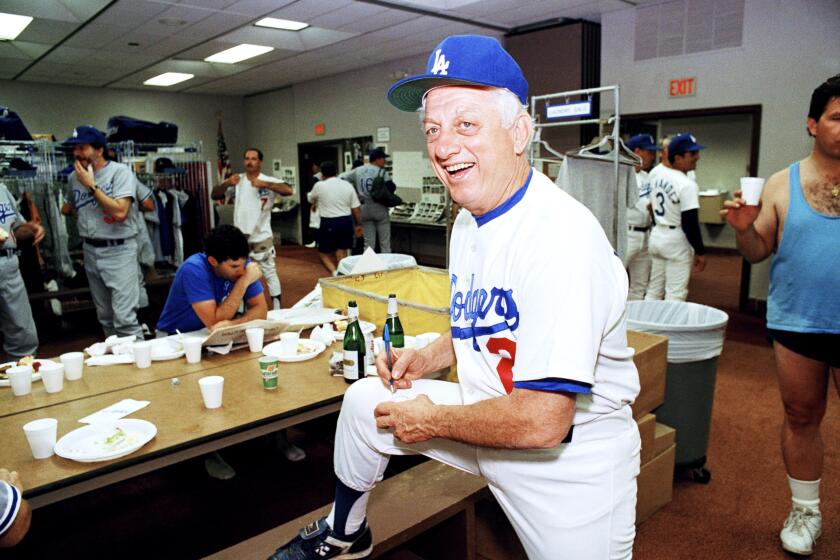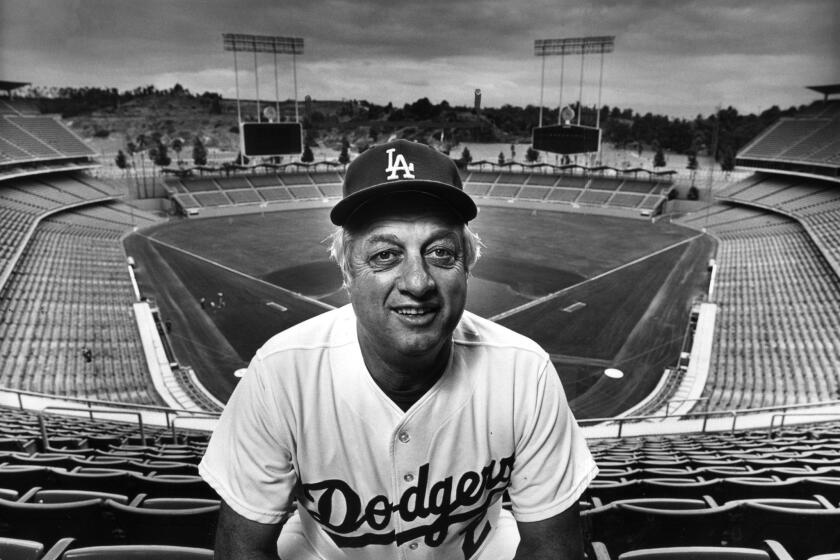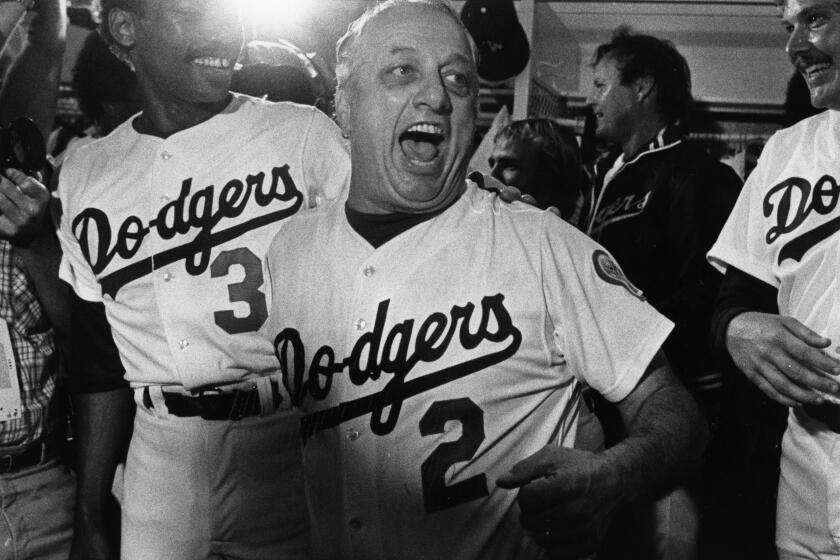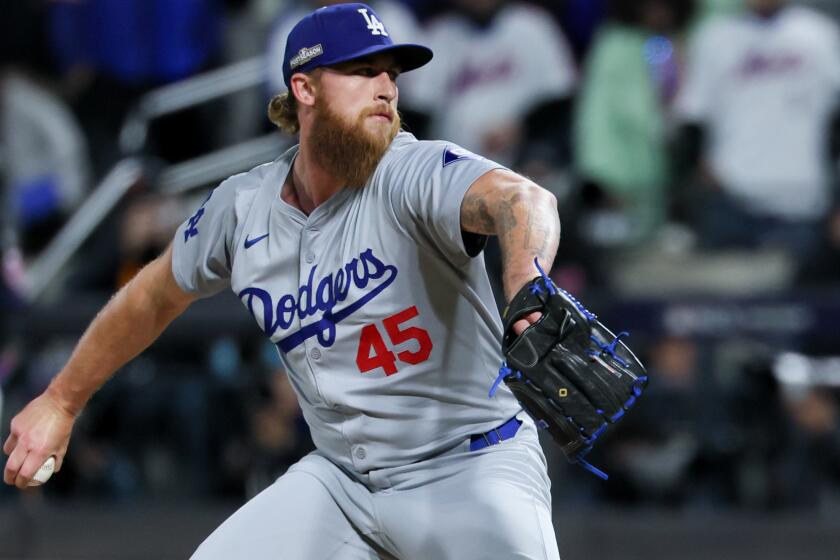Appreciation: Tommy Lasorda was proudest of outlasting every one of his Dodgers contemporaries
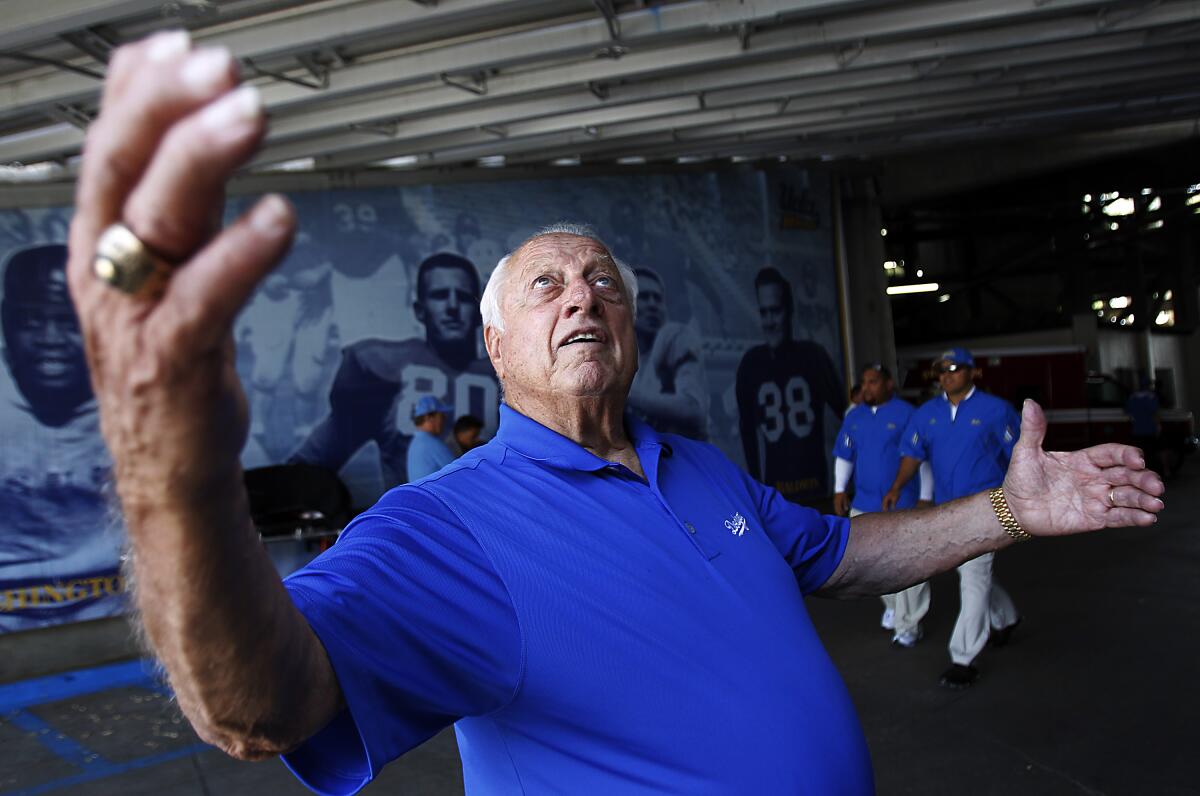
He was always on television throughout my childhood. Now, Tommy Lasorda was driving me around in a golf cart and ranting like a crazy person.
He went on and on, for an hour, maybe two. I periodically looked down at my phone to see what time it was, worried that I was missing something on one of the practice fields.
I was in my first spring training as the Dodgers beat writer and didn’t really know Lasorda yet. Still, as he told me about his life, I found him unusually reflective, so much so that I wondered if he might die that night. Turns out he still had another 12-plus years.
I don’t recall many specifics of that one-sided conversation, other than the point he made at the end.
“People always ask me, ‘Tommy, what are you the proudest of? The World Series? The Olympic gold medal?’” he said. “I say, ‘No.’
“The first time I came here, I was one of 700 players. And I outlasted every one of those motherf—ers.”
This was my real introduction to Thomas Charles Lasorda, who died Thursday night of a heart attack. He was 93.
Tommy Lasorda, who won two World Series championships in 20 years as Dodgers manager, died Thursday night of a heart attack after a long illness.
Put on the blinders and charge forward. That was Lasorda’s philosophy. Believe strongly enough, try hard enough, and anything was possible. Lasorda considered his life proof of that. Born to Italian immigrants, he was a modestly talented left-handed pitcher who somehow became one of the most recognizable figures in Dodgers history.
Or, as he so profanely told me, he outlasted every one of his contemporaries, his 71 years with the Dodgers matched by no other employee, not even Vin Scully. He wasn’t always wanted by them. As a pitcher, he was given up on. As an aging manager, he was nudged into retirement. As an executive, there were periods when he was ignored. But he remained devoted to the organization. He believed that if he loved the Dodgers enough, they would love him back. Ultimately, he was right.
There were limitations to the approach, of course. Lasorda didn’t like to be reminded of that reality, which is why I believe I found myself in that golf cart on that spring day in 2008.
The Dodgers still hadn’t moved their spring training headquarters to Arizona and were at their longtime preseason home in Vero Beach, Fla. Behind the stadium in which they played exhibition games, there was a building that contained their clubhouse and administrative offices.
A crowd of autograph seekers was waiting outside when Lasorda emerged from the building on this particular day. A fan clutching a baseball walked up to Lasorda and politely asked him for an autograph. Lasorda was a stickler about people saying “please” when asking him to sign something. The fan said the magic word and called him “Mr. Lasorda,” but Lasorda nonetheless started screaming at him.
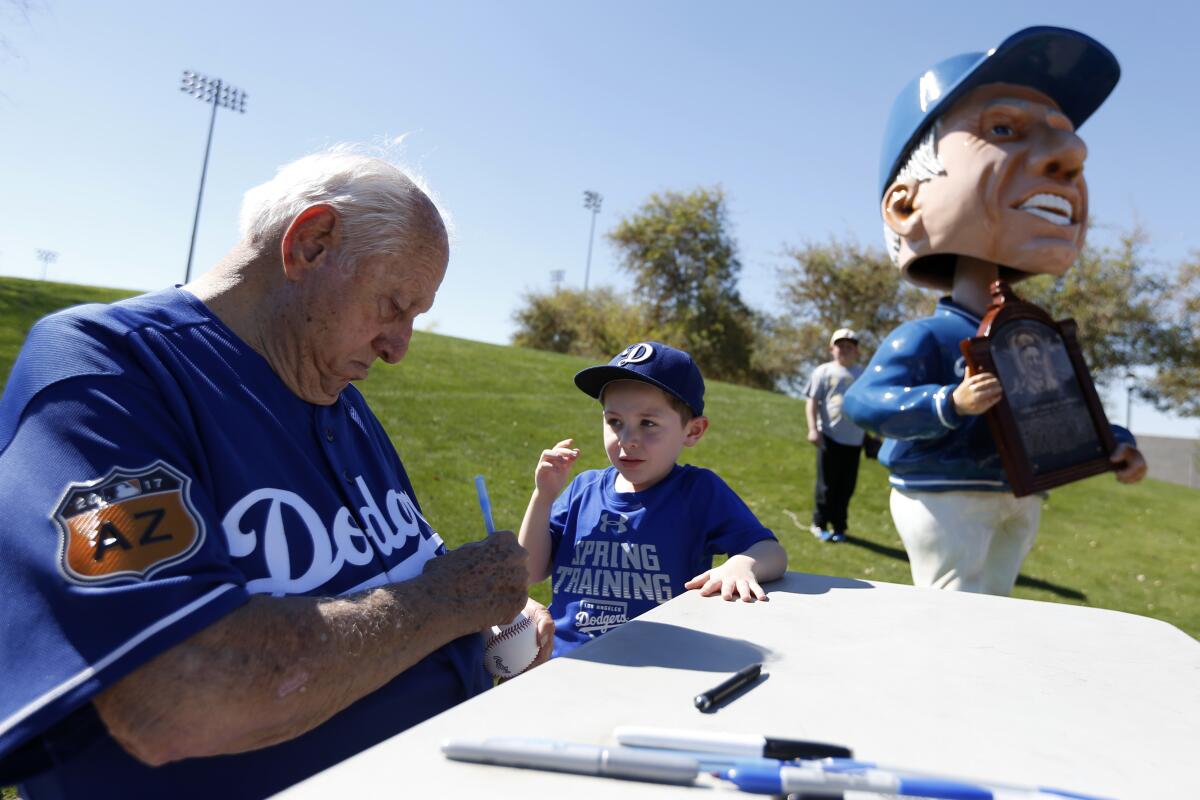
Pointing to the fans who were lined up along a metal barricade set up by the team, Lasorda said, “Don’t you see the line?”
The fan was initially flustered. Once he gathered himself, he meekly informed Lasorda that the people were lined in the opposite direction. They were there for Sandy Koufax, who had dropped by camp.
Embarrassed, Lasorda quickly signed the ball and looked around. Spotting me nearby, he called, “Dylan! Get in the cart with me!”
I did, figuring he would drive me to one of the practice fields to watch drills. I was wrong. He instead pointed the cart toward the golf course on the property and told me how Tom Lasorda became Tom Lasorda.
His overarching point was that his story was a triumph of desire, a desire that drove him to be the last man standing.
Lasorda never once mentioned Koufax by name, but I thought then, and still think now, that he was really talking about Koufax.
A look at the life of legendary Dodgers manager Tommy Lasorda, who died at the age of 93 on Thursday.
Koufax’s addition to the Dodgers roster in 1955 resulted in Lasorda being demoted to the minor leagues. Lasorda never pitched for the Dodgers again. Koufax went on to become one of the greatest pitchers in baseball history. Lasorda took a more roundabout route to fame, as he transitioned from scout to minor league manager to major league coach to major league manager. In his own way, he found as much, if not more, success.
As petty as Lasorda could be, he could also be incredibly warm. He loved to be loved and lived to entertain. He signed autographs for hours. He liked to joke with writers.
Whenever he saw me, he would playfully give me a hard time about my facial hair. He liked to tell me how he once ordered Eric Karros to shave but the first baseman didn’t want to because he was on a hitting streak.
“As soon as the streak ended,” Lasorda would say, “I made him shave!”
“But Tommy, I have my own streak!” I would respond. “I’ve been writing incredible stories every single day!”

Talk about stretching the truth. Lasorda would laugh and tell me he still wanted me to shave. The next time we saw each other, we would repeat the exchange. That was our routine for several years.
The last time I spoke to him was in late March. Opening day was indefinitely postponed because of the COVID-19 pandemic and I called to see how he was doing. As much as he loved taking pictures with fans and waving to them, I thought he might be feeling down about being trapped at home. Except he didn’t exhibit any self-pity.
“I’m 92,” he said, “but I can still fight.”
The greatest motivator of his generation was in vintage form. He spoke of how the United States afforded a high school dropout like him the opportunities to achieve what he did. Such a country, he argued, could overcome a pandemic.
I asked him if this was the year the Dodgers would finally win their first World Series since 1988.
Tommy Lasorda, who died Thursday night of a heart attack at age 93, bled Dodger Blue nearly his entire life, spilling it across every corner of the world.
He roared with laughter and said, “Hey, I say that every year. What are you talking about?”
In October, he traveled to Texas to watch the Dodgers defeat the Tampa Bay Rays. His realized his longstanding dream of watching his team become champions again.
And when Lasorda died Thursday night, he did so having realized his other ambition, of having outlasted every one of those contemporaries.
Because there isn’t another one like him. There won’t be another one, either.
More to Read
Are you a true-blue fan?
Get our Dodgers Dugout newsletter for insights, news and much more.
You may occasionally receive promotional content from the Los Angeles Times.

